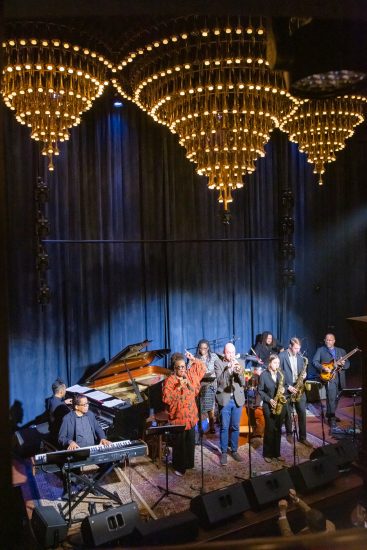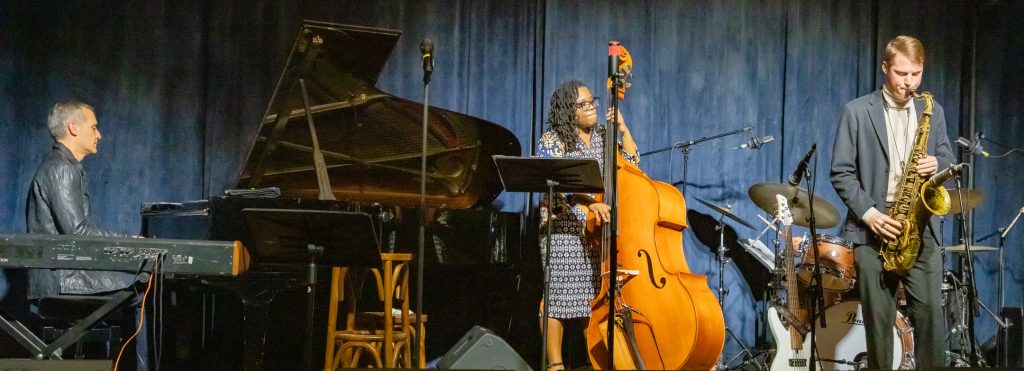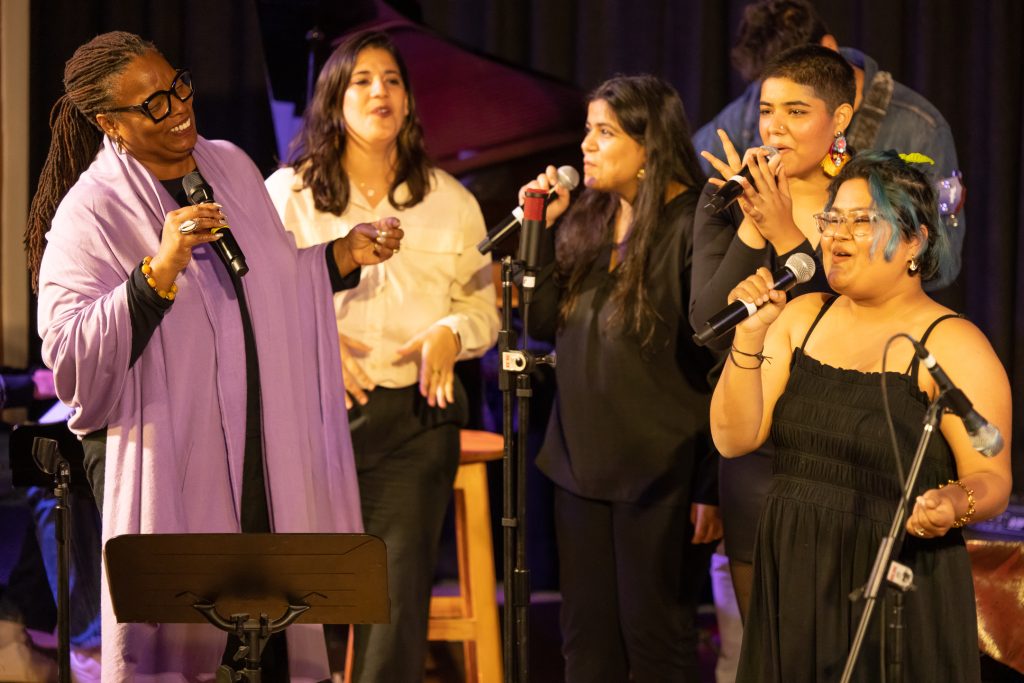Featuring Internationally Renowned Recording Artists DON BRADEN and LISA HENRY
Washington, DC – With lead funding from the National Endowment for the Arts and United Airlines, the Herbie Hancock Institute of Jazz will bring its Peer-to-Peer jazz education program to Rhode Island public schools May 20-24, 2024. Combining performance with educational information, these “informances” will be presented by the Institute’s National Peer-to-Peer Jazz Sextet, comprising six of the country’s most gifted high school music students. They will be featured alongside internationally acclaimed saxophone recording artist Don Braden, Kansas City jazz and blues vocalist and a former winner of the Institute’s International Jazz Vocals Competition Lisa Henry, and renowned jazz educator Dr. JB Dyas. Each school visit will include an assembly program featuring a musical performance for all students, followed by workshops for each school’s jazz band and choir with the visiting student performers playing alongside and sharing ideas with their Rhode Island counterparts.
“We’ve found that sometimes young people can learn about certain things better from kids their same age, and one of them is jazz,” said jazz great Herbie Hancock, Institute Chairman, NEA Jazz Master, and Goodwill Ambassador for the United Nations Educational, Scientific and Cultural Organization (UNESCO). “And when you hear how accomplished these musicians are at such a young age, you know their peers are going to listen.”
Besides playing jazz at a level that belies their years, the students will talk with their Rhode Island peers about what jazz is, why it’s important to America, and how a jazz ensemble represents a perfect democracy. They also will discuss the important American values that jazz represents: teamwork, unity, the correlation of hard work and goal accomplishment, perseverance, and the importance of finding a passion early in life, being persistent, and believing in yourself. When young people hear this important message from kids their same age, they are often more likely to listen.
The members of the all-star sextet selected nationwide to participate in the Rhode Island tour include trumpeter Lucas Rivero (17) from Miami; trombonist Bishesh Paudel (18) from Houston; guitarist Nigel Valle (17) from New Orleans, pianist Nathan Tatsuta (17) from Santa Ana, CA; bassist Læsio Littlejohn (17) from Dallas; and drummer Julian Frazier (18) from Baltimore. “This will actually be my second tour with Mr. Braden,” said Frazier, who toured with him last year for the Institute’s peer-to-peer tour in Arkansas, one of 44 states benefiting from this program since 2005. “That tour really inspired me to get serious and focused.”
Immediately following the informances, Braden, Henry, and Dyas will conduct jazz workshops for each host school’s jazz band and choir. The visiting students will play side-by-side with their Rhode Island counterparts, providing tutelage peer to peer. In so doing, they will teach and learn from one another not unlike what Herbie Hancock did with Miles Davis, Wayne Shorter, and so many other eminent jazz artists over half a century. They’ll also learn about each other’s cities and cultures.
“I’m really looking forward to going to Rhode Island, home of the iconic Newport Jazz Festival,” added Paudel. “So many of my jazz heroes have performed there.”
ABOUT THE ARTISTS & EDUCATORS
Don Braden is one of the top tenor saxophonists and jazz flutists on the scene today. Appearing on more than 100 albums, including 20 as leader, Braden has recorded and performed around the globe with such eminent jazz artists as Randy Brecker, Betty Carter, Gerald Clayton, Herbie Hancock, Tom Harrell, Roy Haynes, Freddie Hubbard, Dave Liebman, Wynton Marsalis, Christian McBride, Terell Stafford, Dave Stryker, Jeff “Tain” Watts and Tony Williams. He is also a prolific and versatile composer, writing for ensembles ranging from duo to full symphonic orchestra in all styles of jazz, pop and world music for recordings, film and television. Besides being an internationally acclaimed performer and composer, Braden is a renowned jazz educator and has served on the faculties of Harvard, Montclair State and William Paterson universities. Formerly the artistic director of New Jersey Performing Arts Center’s Jazz for Teens program, Braden currently serves as music director for the Litchfield Jazz Camp and presents workshops and master classes around the world. His latest recording, Earth, Wind, and Wonder – Volume 2 – comprising his jazz arrangements of Earth, Wind & Fire and Stevie Wonder tunes – has received critical acclaim. www.donbraden.com
Lisa Henry is a dynamic vocalist with a combination of swingin’ cool and down home class. A Kansas City native, she began by singing gospel music in the Baptist church, and by age 12 was singing the music of Billie Holiday and Miles Davis. Henry was a winner of the Herbie Hancock Institute’s International Jazz Vocals Competition and was later named an International Jazz Ambassador to Africa. She toured Chile, Argentina, and Peru with the Institute in the 1990s, performing for 34 Heads of State at the Summit of the Americas. In 2006 she participated in a U.S. State Department-sponsored tour of India and performed for an esteemed presidential dinner at the White House, celebrating the Institute’s 20th Anniversary. Over the past 25 years, Henry has toured the globe, sharing the stage with such artists as Ambrose Akinmusire, Kenny Barron, Don Braden, Bobby Broom, Gerald Clayton, Robin Eubanks, Kenny Garrett, Herbie Hancock, Roy Hargrove, Antonio Hart, Ingrid Jensen, Sean Jones, Kevin Mahogany, Delfeayo Marsalis, Wayne Shorter, Terell Stafford, Bobby Watson and Steve Wilson. Her Live from 18th and Vine recording has been lauded by jazz fans and critics alike. www.lisahenryjazz.com
Dr. JB Dyas has been a leader in jazz education for the past two decades. Formerly the Executive Director of the Brubeck Institute, Dyas currently serves as Vice President for Education and Curriculum Development at the Herbie Hancock Institute of Jazz. He oversees the Institute’s education and outreach programs including Jazz In America: The National Jazz Curriculum (www.jazzinamerica.org), one of the most significant and wide-reaching jazz education programs in the world. Throughout his career, he has performed across the country, taught students at every level, directed large and small ensembles, and developed and implemented new jazz curricula. He has written for DownBeat magazine and other national music publications, presented numerous jazz workshops, teacher-training seminars and jazz “informances” around the globe with such renowned artists as Dave Brubeck and Herbie Hancock, and created a series of teacher-training jazz education videos. Dr. Dyas received his master’s degree in Jazz Pedagogy from the University of Miami and PhD in Music Education from Indiana University, and is a recipient of the DownBeat Achievement Award for Jazz Education.
ABOUT THE HERBIE HANCOCK INSTITUTE OF JAZZ
The Herbie Hancock Institute of Jazz is a nonprofit education organization with a mission to offer the world’s most promising young musicians college level training by internationally acclaimed jazz masters and to present public school music education programs for young people around the world. The Institute preserves, perpetuates and expands jazz as a global art form, and utilizes jazz as a means to unite people of all ages, backgrounds and nationalities. All of the Institute’s programs are provided free of charge to students, schools and communities worldwide. The Institute’s programs use jazz as the medium to encourage imaginative thinking, creativity, a positive self-image, and respect for one’s own and others’ cultural heritage. Jazz great Herbie Hancock serves as the Institute’s chairman. www.hancockinstitute.org.
ABOUT THE NATIONAL PERFORMING ARTS HIGH SCHOOL JAZZ PROGRAM
The Herbie Hancock Institute’s National Performing Arts High School Jazz Program facilitates the education of gifted music students who attend public performing arts high schools across the nation. The Program offers them opportunities to participate in pre-conservatory, highly specialized, performance-based jazz curricula; study with some of the world’s most eminent jazz artists and educators; perform in jazz ensembles comprising their peers; and prepare for entry into the country’s most distinguished conservatories and university schools of music. Included is instruction in Jazz Improvisation, Theory, Composition, History, and Styles and Analysis. The Institute works with each school in developing jazz curricula and instructional methodology; provides ongoing private and group instruction with Institute teaching staff, visiting artists and educators; offers special residences with jazz masters; arranges high-profile performance opportunities for the student ensembles; and assists graduating seniors with securing college scholarships.
ABOUT THE PEER-TO-PEER JAZZ EDUCATION INITIATIVE
Through the Herbie Hancock Institute’s National Peer-to-Peer Jazz Education Initiative, which receives lead funding from the National Endowment for the Arts and United Airlines, outstanding music students from public performing arts high schools across the nation are invited to participate in weeklong peer-to-peer jazz informance tours. The young musicians gain invaluable performance experience playing alongside internationally acclaimed artists while they, in turn, help educate young audiences in public schools throughout the U.S. about jazz, America’s indigenous musical art form. In so doing, they not only help develop jazz audiences for the future, but also exemplify the deeply held American values that jazz represents: teamwork, unity, democracy, persistence and perseverance, and the vital importance of really listening to one another.
* Media Day/VIP Concerts
- Warwick – Tuesday, May 21 • 10:00 am – Pilgrim High School, 11 Pilgrim Pkwy, Warwick, RI 02888
With opening remarks by special guests: Frank Picozzi, Mayor, City of Warwick • Lynn Dambruch, Superintendent, Warwick Public Schools
- Newport – Wednesday, May 22 • 9:15 am – Rogers High School, 15 Wickham Rd, Newport, RI 02840
With opening remarks by special guests: Xay Khamsyvoravong, Mayor, City of Newport • Dr. Colleen Jermain, Superintendent, Newport Public Schools
- Providence – Friday, May 24 • 1:00 pm – Hope High School, 324 Hope St, Providence, RI 02906
With opening remarks by special guests: Brett Smiley, Mayor, City of Providence • Angélica Infante-Green, Commissioner, Rhode Island Department of Education • Dr. Javier Montañez, Superintendent, Providence Public Schools
For more information, full-length bios and photos, or to schedule an interview with the artists and/or students, please contact: JB Dyas at jbdyas@hancockinstitute.org or 323-270-3904.





